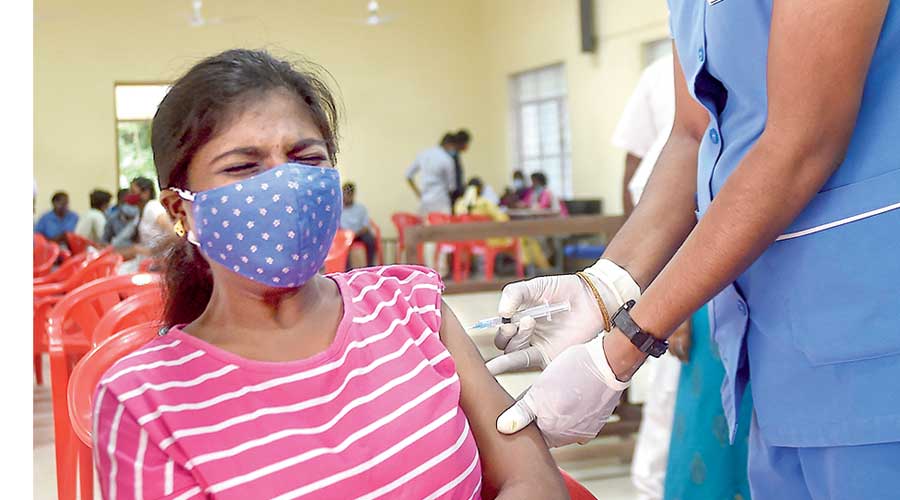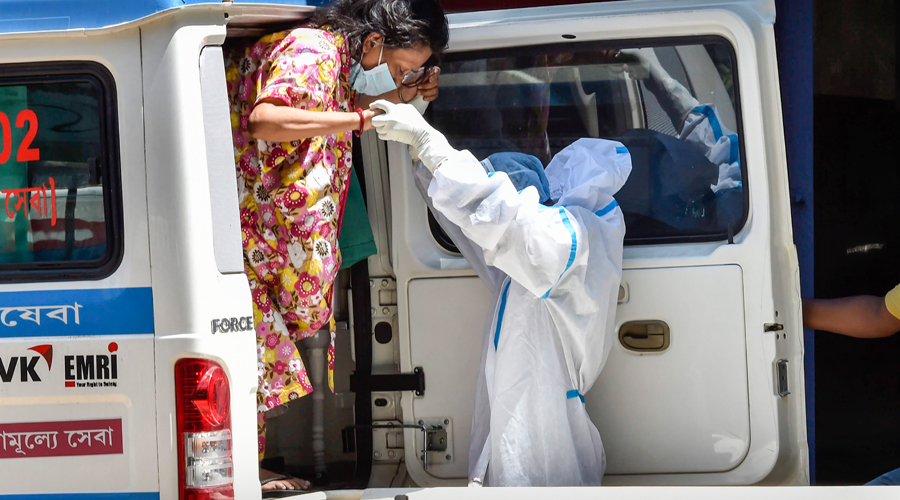The highly contagious delta coronavirus variant may cause breakthrough infections after immunisation more frequently than hitherto assumed, Indian researchers said on Sunday after detecting unexpectedly large proportions of infections in Covishield recipients.
Their findings also corroborate an abundance of earlier evidence that Covid-19 vaccines protect recipients from severe disease. But the large proportions of breakthrough infections by the delta variant underline that potential gains could be made by tweaking the vaccination policy, the researchers have said.
The researchers have detected signatures of the delta infection in 25 per cent of 95 healthcare workers in five hospitals across the National Capital Region who were fully immunised with two Covishield doses.
These infection rates are higher than the 9 per cent observed at the Christian Medical College, Vellore, and the 1.6 to 2.6 per cent at the Postgraduate Institute of Medical Education and Research, Chandigarh, earlier this year. Doctors in a Delhi hospital had reported a figure of 12 per cent earlier this month.
“The primary purpose of protection from severe disease is well met by the vaccines — here, Covishield,” said Anurag Agrawal, a pulmonary medicine specialist turned researcher and director of the Institute of Genomics and Integrative Biology, New Delhi.
“There was no severe disease or death among this cohort (group) of vaccinated healthcare workers even during one of the worst delta surges,” Agrawal tweeted, referring to India’s second Covid-19 wave that had peaked during late April and early May.
But the large proportion of breakthrough infections and a 48 per cent post-immunisation infection rate among single-dose recipients indicate an urgency to revise vaccination policies for more effective use of the existing vaccines, the researchers said.
These infection rates were seen in small samples of high-risk people, such as health workers.
Still, the 48 per cent infection rate after a single dose is “unacceptably high”, Agrawal and his colleagues wrote in their study, not yet peer-reviewed but posted on Sunday on medrxiv, an online archive for research papers.
“The vaccination policy needs to be tailored to the local status of the epidemic,” Shantanu Sengupta, a senior biologist and a member of the study team at the IGIB, told The Telegraph.
“In areas with a large proportion of susceptible people and where the delta variant is circulating, it would help to shorten the gap between the two Covishield doses.”
The study has also found that Covishield — like other vaccines — sharply boosts immune responses in recipients who have earlier had Covid-19. In populations where large proportions of people are already protected from natural infections, a longer dose gap may be appropriate.
The highly contagious delta variant, first detected in India, now makes up over 86 per cent of the virus samples sequenced in the country and has turned up in over 80 countries.
Multiple studies from India and other countries have already shown that the delta variant can evade the immune responses generated by the existing Covid-19 vaccines, although the vaccines protect people from severe disease or death.
But the IGIB-Max study is the first to quantify the amount of antibodies needed to neutralise the delta variant -- around 1,500 units per ml of blood serum. It also suggests that vaccine recipients with prior Covid-19 infections are the likeliest to show such high antibody levels.
The large proportions of breakthrough infections among vaccine recipients bolster the evidence for suggesting that the existing vaccines might not help achieve the so-called herd immunity threshold and stop the epidemic in populations where the delta variant is dominant.
The herd immunity threshold is a point at which such a large proportion of people in a population are protected through vaccines or natural infection that the virus finds it hard to spread and the epidemic fades, although a trickle of cases may continue as the infection turns endemic.
A study at the Sir Ganga Ram Hospital, New Delhi, had earlier this month found that a single dose of Covishield offers no protection from symptomatic Covid-19 or from severe disease.












